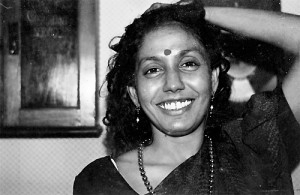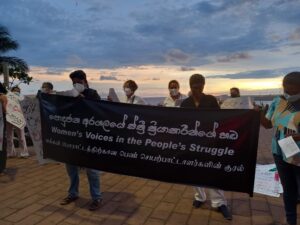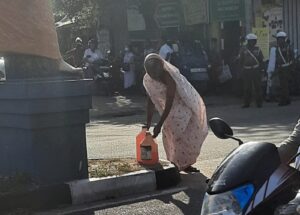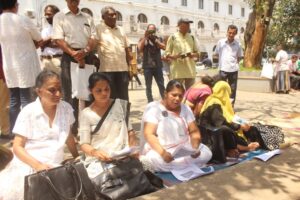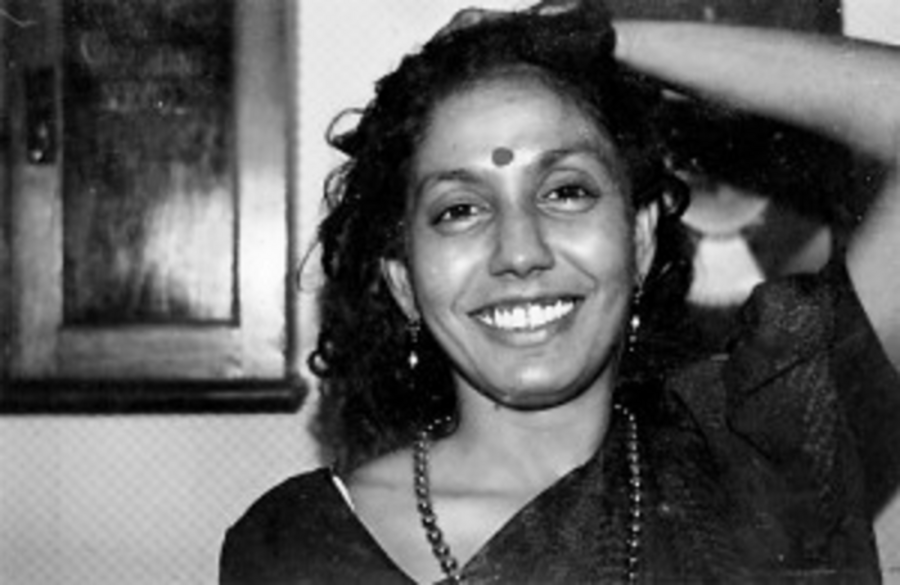
The Rajani Thiranagama Memorial Lecture was delivered in Tamil by V. Geetha on 2 October 2021.
When I was invited to deliver a lecture on the occasion of Rajani Thiranagama’s death anniversary, I felt honoured. Contemplating what I could say on this sombre occasion, I felt somewhat beholden to the pasts that Rajani had stood witness to, and also the future that stood to gain and learn from that past. I also felt dutiful: feminists across the world know that if we do not remember those who lived the feminist life, none others will. And remembering is also an intergenerational responsibility, an act of care and nurture. Further, to remember Rajani is to remember many others who are not mourned enough, or considered mournable – Sivaramani, Selvi, and those nameless women, literate and not, middle class and working class, who paid with their lives for standing up against armed tyranny.
To prepare for this talk, I returned to The Broken Palmyra. Reading a text, as we all know, is seldom an innocent act: we read for meaning, to identify a contrary point of view and denounce it, to affirm our own ideas . . . but reading is also shaped by where we are and in this sense we are bound to read the same text differently at different times. And so it was with this one: as I leafed through the narrative, it struck me that here was a classic critique of nationalism. Written at a time and place which saw the coming together of Sri Lankan majoritarian nationalism, insurgent Tamil nationalism, and the hegemonic and ambitious nationalism of the Indian nation-state, the book perceptively identified the core issue at stake: the wrongs of nationalism had not only to do with an aggressive assertion of identities, or with failed political systems and states, rather it had to do with how the human is conceived of, within each kind of nationalism. However, we mark the divide between ‘us’ and ‘them’, it is evident that this line of difference has to do with thinking of human persons in the aggregate, rather than as irreducible beings, each a tangle of emotions, ideas, experiences, memories . . .
Further, reasoning thus, nationalisms help to create cultures of fear, mistrust, and violence, such that the world ceases being a site for the fraternal life, and instead appears riven in a given sort of way. The right to self-determination, which seeks to challenge this manner of thinking of the nation is fundamentally a democratic right and one that has to earn collective consensus, or else it risks turning crudely sectarian – as happened in the case of the Tamil insurgency, leading to internecine killings and the alienation of dissident and other populations, such as the Northern Muslims, who were viewed as recalcitrant ‘Others’.
Reading Rajani’s poignant account of the unravelling of society in the North of Sri Lanka, I became all too aware of the role played by India – the arrival of the Indian Peace-keeping Force (IPKF) marked a point of no return, rendering an already fraught atmosphere even more so, and making for a politics of impunity that could be assumed by anyone in uniform and who had access to arms. Indians, even civil rights activists, have not quite reckoned with India’s role critically. While there were demonstrations and protests in Tamil Nadu against the deploying of the IPKF at the time, this show of anger was as much shaped by an unconditional support extended to the Tamil insurgents, particularly the Liberation Tigers of Tamil Eelam (LTTE), for it was feared that the IPKF had been sent expressly to contain the demand for a Tamil State.
In this sense, to re-read The Broken Palmyra seemed an act of atonement as well; and a means of thinking of the long term effects of war, not just the destruction of life worlds and environments, but also the loss of loved ones, and the killings that were directed at almost all communities in Lanka. For, as Rajani pointed out, war remakes all that it affects, on its own terms:
A state of resignation envelopes the community. The long shadow of the gun has not only been the source of power and glory, but also of fear and terror as well. In the menacing shadow play, forces complementing each other, dance in each other’s momentum. The paralysing depression is not due to the violence and authority imposed from outside, but rather to the destructive violence emanating from within the womb of our society. (Thiranagama 1990: xi)
Sharika Thiranagama (2013) has reiterated this understanding, and pointed to how war insists that you view ‘terror’ as normal, and demands you live with it. In this context, to remember Rajani, is to remember what it means to live with war, and struggle to retain one’s sense of the irreducible human. And this brings us to what I wish to address, and which is implicit in Rajani’s narrative: what war does, matters to those who identify with life, who provision it, care for and nurture it, and how we might make claims for non-violence and justice. It seems to me that to continue to live in equality, with a shared commitment to social justice and togetherness, calls for a feminist understanding of democracy. An understanding that goes beyond the protocols of political representation, the making and unmaking of governments, and which has to do with our capacity for what Dr Ambedkar, modern India’s greatest thinker, called ‘associated living’, and which requires a larger culture of respect and reciprocity to flourish.
Given the incremental and in some ways endemic militarisation of existence on this planet, which has as much to do with how we engage with its resources, as it has to do with how we separate and annihilate populations, this appears an important concern. In what follows I point to how, in different contexts, women have held onto a politics and ethics of dialogue, care, and self-worth. It seems to me that this has as much to do with the everyday, as it has to do with civic life, for in reality, every act of care is politically consequential. To offer shelter to a woman who faces battering could well land us in a complicated judicial process; caring for a child that is in danger of being trafficked, or a queer person who is being threatened could well mean that we are up against laws and a state system we have to negotiate. The question then is, how do we do a democracy that answers to our sense of equality and justice, as well as care and nurture?
***
India, as we are all told, is a working model of plebeian democracy. The country has not seen a dictatorship nor has it been under army rule. Elections are regularly held, there is relative freedom of the press, and thorny political issues are discussed and argued, within and outside Parliament and other representative assemblies. While this is not untrue, Indian democracy ‘works’ as long as we do not transgress its constitutive limits. These latter are set by what the Indian State will not countenance: what it views as threats to its sovereignty and security; its model of economic growth, and its understanding of social integration.
Questions of sovereignty ought to be addressed keeping in view the fact that it is the people and not the State that is sovereign, but when you have formal systems for a representative democracy in place, it is easy to elide this fact and cross over from ‘the people’ to the people’s representatives, and through them to their constituent institution, the ‘nation-state’. In the Indian context, the interests of the latter have been defined as much by its recalcitrant constituents, as by those who abide by the national consensus. The struggles for self-determination in Kashmir and the North-East of India have been denied the dignity of their objective and viewed as terrorist acts, and the interrogation of the State’s wisdom on this subject is branded seditious.
Likewise, to speak for those that our economic growth model dispossesses, whether our Adivasi populations or fishers, poor subsistence farmers or pastoralists, can and does earn the wrath of the State. These reactive restrictions on democracy in fact mark its existence, just as the constitutional promise to ensure an equal and free society. This latter, meanwhile, is rendered problematic by what the State has sought to brush away – the constitutive inequality of the Indian social order, with its caste system and practices of untouchability.
In this context, it is not accidental that struggles for civil and democratic rights have had to do with this mismatch between constitutional promises and everyday life in India. Feminists have addressed this gap, and I wish to note here that we, in India, have a lot to learn from our feminist comrades elsewhere, particularly in Sri Lanka and Pakistan.
Writing about nationalism in the so-called third world, which emerged in the wake of anti-colonial struggles, and what it bodes for its female adherents, Kumari Jayawardena (1986) warned us of not only the limits and hypocrisies of bourgeois nationalism, but also its vision of the family. The family, she noted has been made the bedrock of identity, and this has meant that across South Asia, nationalism is asserted in and through gendered rhetoric and a skilful, canny, and often violent management of women’s rights, needs, concerns, and desires. A similar critique was put forth by Pakistani feminists who pointed to the emergence of a certain vision of the Islamic family and community, and how that was sustained through a legal trampling of women’s rights under President Zia ul Haq.
In the Indian context, we did not seek to align our critique of the family with a firm critique of the limits of nationalism and the nation-state. As Uma Chakravarti (2018) has pointed out, charmed as many Indian feminists were of what they understood to be the ‘secular’ and ‘multicultural’ nature of Indian democracy, they did not seek to interrogate what the nation would not countenance – its obsession with sovereignty and security. This happened only in the 1990s and after, when feminist scholarship examined the experiences of women during the partition of the subcontinent into two nations, and in that context called attention to how women’s bodies were made to bear witness to assertions of national and religious identities.
On the other hand, those who engaged with the State in an everyday sense were able to both bear witness to its impunity, when challenged on any of the above three matters, as well as bend the institutions of democratic governance to their purpose. This is evident from the fact that women who have been assaulted and raped, on account of their caste and community, or because they refused to give into demands by men from dominant castes and classes, have consistently engaged with the criminal justice system. Filing affidavits, being available for court hearings, negotiating threats to their persons, and working with parties and movements that support their cause, they have kept faith with democratic promise, though in many cases it has taken anything between a decade and even two decades to obtain justice. In some instances, women have made clear that theirs is not a punitive anger, rather they want legal acknowledgement of the wrong done to them. These brave women stand in for our collective conscience, as they steer clear of a politics of violent reprisal, which is not wanting in India, as well as one of easy accommodation with the ruling classes and castes.
For women who struggle thus, it is life itself that is at stake – not merely their right to life, which is protected by the Constitution, but the act of living as such, which stands imperilled by everyday impunity. And if we inspect closely the reasons for women taking to struggle for their rights in public, it becomes increasingly clear that their justice claims are also claims for life in the face of all that seeks to destroy it.
***
In 2018-19, the government of India sought to amend its citizenship laws in ways that raised questions about the status of India’s minority and marginal populations, particularly Muslims. Demonstrations and sit-ins were organised across India, protesting these laws, and protracted resistance led by women was visible on the streets of Delhi, in and around a settlement called Shaheenbagh. Women of all ages, chiefly from Muslim communities sat on the streets for weeks on end, and made clear that they were laying claims to equal citizenship, not only on the basis of their constitutional rights, but because this was where they lived, belonged, and where they had made a home.
To them, it was not a question of fulfilling formal requirements of belonging, but of bearing witness to how they had ‘made place’, made life liveable, over generations. In Sri Lanka, this has been an aspect of everyday politics, given the scale of displacement, internal migration, and being confined to camps. In all contexts, women have sought to create enabling living conditions, as if to say that to live is to make life liveable, in however limited a manner – creating, as it were, zones of care, nurture, and safety. We do this, notwithstanding the fact that the space that women make is seldom recognised as one that they are equally entitled to. The place of home, as we all know, is one where our rights are eroded.
In a sense the women of Shaheenbagh were calling attention to the fact that the State cannot lay claims over citizenship, such that it retains for itself the right to divide a legitimate ‘us’ from an illegitimate ‘them’ and that it is people, working, living, caring, and building meaningful social worlds who are sovereign.
Some years ago, a group of women in the North-East of India, in the state of Manipur had called the Indian army out for a brutal act of rape and murder, of a young woman. Stripping themselves naked, these ‘Meira Paibis’, comprising a community of mothers, stood outside an army camp and raised the slogan, ‘Indian army, rape us’, seeking to shame the soldiers into realising the enormity of the crime committed by one of their own. As I have noted elsewhere, they literally put their bodies on the line, to bear witness to ‘naked’ humanity, as if to say the right to live is synonymous with recognising the inherent mortality and vulnerability of all flesh. Unsurprisingly, it was a woman from this part of India, Irom Sharmila, who went on a fast for over a decade, demanding the withdrawal of laws that granted special powers to the armed forces – she demonstrated the strength that it took to protest in the face of brute violence, pitting ‘soul force’, as it were, against armed might (Geetha 2016).
The claims of living for existence are forefronted also in struggles for control over community resources, particularly in environmental struggles, where the issues at stake are not only of dispossession and criminal capital accumulation, but also the right to live in ways that are not to be determined by given notions of development and progress. Adivasi communities, as Ranjana Padhi (2020) points out, fight precisely for such rights, to live in modest ways, and in relationship to forest and river, mountain and sea. Women from these communities lay claims to these commons in the name of an overarching fellowship with the non-human world. In this view, the hills and rivers that they seek to protect and embrace are their kin, not only in a figurative sense, but a deep existential sense as well. In some places, this notion of being part of a larger cosmos comes up against its limits – social inequalities, especially on the basis of caste, militating against a larger kinship. Yet, there is something to be learnt here, especially for those of us who imagine that the movement towards an urban world of promise and plenty is inevitable. For these communities, and the women who speak in their names, privation and hunger are part of existence, and while they work hard to keep both at bay, they do not wish to take apart the natural world in order to have access to a given notion of plenty or wellbeing.
Women seeking to hold their own scale of justice in place on the basis of their labouring lives is something that we were witness to in a protracted struggle against caste discrimination. In 2016, a young dalit scholar, Rohith Vemula, took his own life, because of the unimaginative and indifferent attitude of his university administration towards dalit students, who sought what was owed to them, by way of scholarships and related rights. Since then, we have come to view this tragic event as an instance of institutional murder. Rohit Vemula’s mother, Radhika Vemula, was in the forefront of struggles that sought to hold the university responsible for their crimes of omission. A remarkable woman who had raised her children as a single parent, she called out to her son’s comrades and other students to not lose faith and take their lives – and she did this, by pointing to all those who had laboured to make their lives liveable, in this instance, their mothers. As she noted, those who contemplate self-destruction ought to remember their mothers, who are labourers on the field, factory workers, grass cutters, tailors . . .and keep in mind how they live and work for others to survive. In a sense, she bridged two sorts of ideals, an ethic of care and survival, and constitutional labour, necessary to keep our democratic ideals alive.
***
In all these instances of struggle, we see a set of issues at stake, which have to do with not merely resisting injustice, but which seek to build, care, and nurture. Whether this has to do with ‘making place,’ putting forth the claims of shared mortality, insisting that we think along with and not against the natural world with which we are intimately linked, or calling attention to women’s labour that provisions existence, we see that the demand for rights and justice is nothing short of a demand for life. And this then becomes the bedrock of struggles that are ultimately oriented towards a democratic existence, understood, as Dr Ambedkar did, as a form of living, defined by mutuality, equality, and fraternity.
V.Geetha is a feminist historian, translator, and publisher. She has been active in the Indian women’s movement for over three decades, and engages in non-university teaching on gender, caste, labour, and history with civil society groups. Her published works include Bhimaro Ramji Ambedkar and the Question of Socialism in India(2021) and Undoing Impunity: Speech against Sexual Violence(2016).
References
Jayawardena, Kumari. (1986). Feminism and Nationalism in the Third World. London: Zed Books.
Jayawardena, Kumari and Malathi de Alwis. (Eds.). (1996). Embodied Violence — Communalising Women’s Sexuality in South Asia. London: Zed Books.
Chakravarti, Uma. (2008). Archiving the Nation-state in Feminist Praxis: A South Asian Perspective. New Delhi: Centre for Women’s Development Studies, Occasional Paper, No. 51.
Padhi, Ranjana & Nigamananda Sadangi. (2020). Resisting Dispossession: The Odisha Story. New Delhi: Asskar Books.
Hoole, Rajan, Daya Somasundaram, K. Sritharan, and Rajani Thiranagama. (1990). The Broken Palmyrah, Second Preface. Claremont: The Sri Lanka Studies Institute. Accessed May 25, 2022. Available at https://uthr.org/BP/preface2.htm.
Thiranagama, Sharika. (2013). In My Mother’s House: Civil War in Sri Lanka. New Delhi: Zubaan Books.
V. Geetha. (2016). Undoing Impunity: Speech after Sexual Violence. New Delhi: Zubaan Books.

